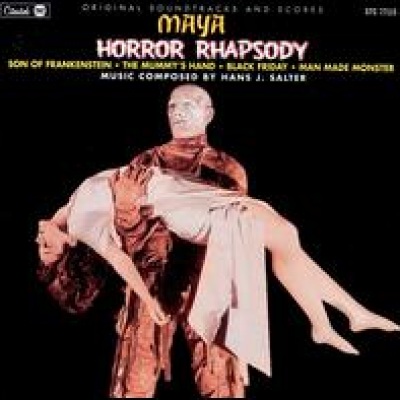
Maya/Horror Rhapsody
by Bruce EderThis CD is a fascinating document of a little-known and even less well-remembered episode in the career of one of old Hollywood's veteran film composers. Hans J. Salter started in movies in the 1930s, and his heyday was in the 1940s and early '50s -- in the mid-'60s, however, he was engaged by the King Brothers to write the score for the new series, Maya, that they were producing for NBC. It was the first weekly dramatic series ever shot entirely in India, and offered all concerned with its production new challenges and opportunities, but Salter most of all; he had been engaged to write the score before a single frame of film was shot, or a script for the series written, and was thus forced to generate the library of soundtrack music for the series totally on his own, anticipating what would be needed. The result is closer to absolute music than one would expect from a soundtrack, built around cues that only later became attached to specific images. In preparation for the project, Salter steeped himself in Hindu music, and the resulting body of work is far more sophisticated in that department than the typical Hollywood score of the era -- it might not be a match for Gustav Holst's brand of Orientalism, but it's several cuts above the film scores of the time. What's more, the digital transfer of the source tapes is so crisp that all of the unusual instrumental timbres are audible in sharp relief, making this CD a delight to the ear on that level. The 22 minutes of music from the 1966 series has been augmented here with Salter's "Horror Rhapsody," a 1941-vintage recording by the composer of highlights from his scores for The Mummy's Hand, Black Friday, Son of Frankenstein, and Man Made Monster. The sound here isn't as rich or crisp as the 1960s recordings, although the source material has been cleaned up nicely and the playback requires few apologies or explanations -- even casual movie viewers who remember the four Universal titles represented may find themselves swept up by the momentum and content of the rhapsody, so familiar did some of this material become through reuse in other movies of the period. The annotation is thorough, and delves into Salter's broader career as well as the particular scores and productions at hand.
